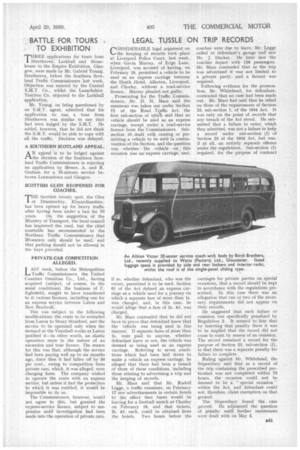LEGAL TUSSLE ON TRIP RECORDS
Page 51

If you've noticed an error in this article please click here to report it so we can fix it.
rONSIDERABLE legal argument on
the keeping of records took place at Liverpool Police Court, last week, when Gavin Murray, of Edge Lane, Liverpool, was accused of having, on February 19, permitted a vehicle to be used as an express carriage between the Heath Hotel, Allerton, Liverpool, and Charley, without a road-service licence. Murray pleaded not guilty.
Prosecuting for the Traffic Commissioners, Mr. D. H. Mace said the summons was taken out under Section 72 of the Road Traffic Act, the first sub-section of whiA said that no vehicle should be used as an express carriage, except ,under a road-service licence from the Commissioners. Subsection 10 dealt with causing or permitting a vehicle to be used in contravention of the Section, and the question was whether the vehicle on this occasion was an' express carriage, and,
if so, whether defendant, who was the owner, permitted it to be used. Section 61 of the Act defined an express carriage as a vehicle used for a journey on which a separate fare of more than Is. was charged, and, in this case, he would allege that a fare of 2s. 4d. was charged.
Mr. Mace contended that he did not have to prove that defendant knew that the vehicle was being used in this manner. If separate fares of more than Is. were paid to anyone. whether defendant knew or not, the vehicle was deemed as being used as an express carriage. Referring to seven conditions which had been laid down to make a vehicle an express carriage, he alleged that there had been a breach of three of those conditions, including those relating to advertising a trip and the keeping of records. Mr. Mace said that Mr. Rudolf Legge, a traffic examiner, on February 17 saw advertisements in certain hotels to the effect that buses would be leaving for a football match at Chorley on February 19, and that tickets, 2s. 4d. each, could be obtained from the hotels. Two hours before the coaches were due to leave, Mr. Legge called at defendant's garage and saw Mr. J. Ducker. He later saw the coaches depart with 128 passengers. Mr. Mace contended that as the trip was advertised it was not limited to a private party, and a licence was required. Following evidence for the prosecution, Mr. Whitehead, for defendant, contended that no case had been made out. Mr. Mace had said that he relied on three of the requirements of Section 25, sub-section 1, of the 1934 Act. It was only on the point of records that any breach of the Act stood. He submitted that a failure to enter, which they admitted, was not a failure to keip a record under sub-section (f) of Section 25 of the 1934 Act, but was, if at all, an entirely separate offence under the regulations. Sub-section (1) required, for the purpose of contract carriages for private parties on special occasions, that a record should be kept in accordance with the regulations prescribed. In this case there was an allegation that one or two of the necessary requirements did not appear on their records.
Ile suggested that such failure or omission was specifically penalized by Regulation 21 It seemed to him that by inserting that penalty there it was to be implied that the record did not cease to exist by reason of an omission. The record remained a record for the purpose of Section 25, sub-section (1), in that there was a separate penalty for failure to complete. Ruling against Mr. Whitehead, the Stipendiary said that as a record of the trip containing the prescribed particulars was not completed within 72 hours, the occasion could not be deemed to be a "special occasion" within the Act, and defendant could not, therefore, claim exemption on that ground. The Stipendiary found the case proved. He adjourned the question of penalty until further summonses were dealt with on May 5.






















































































